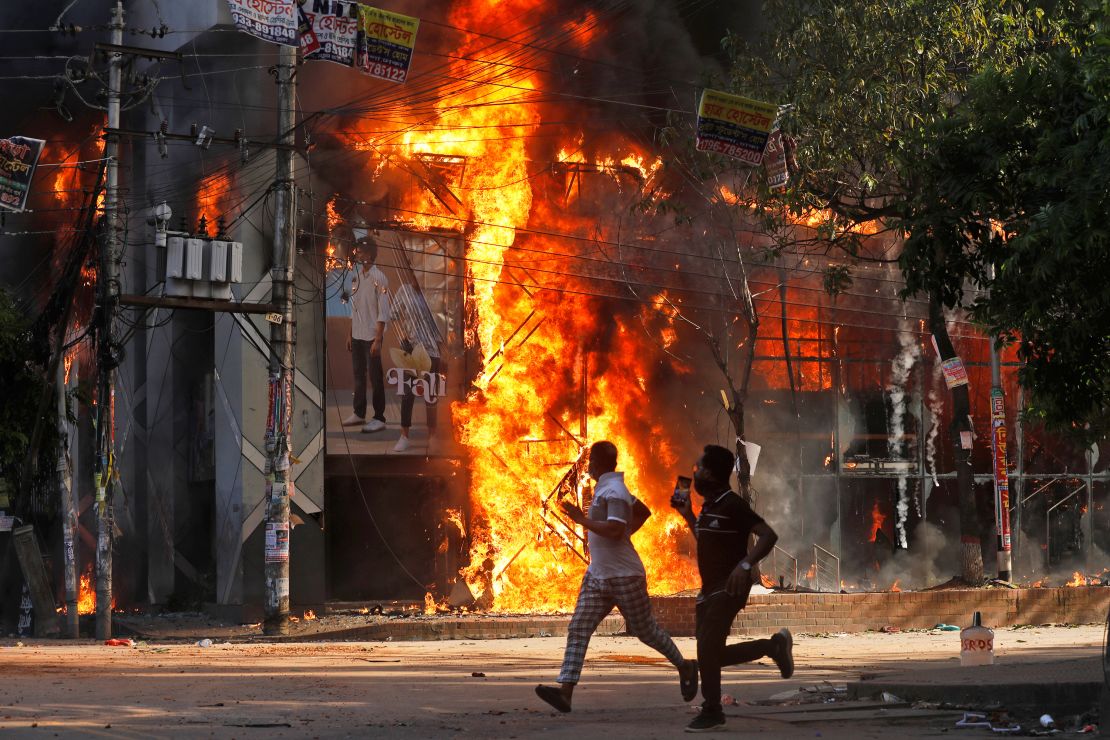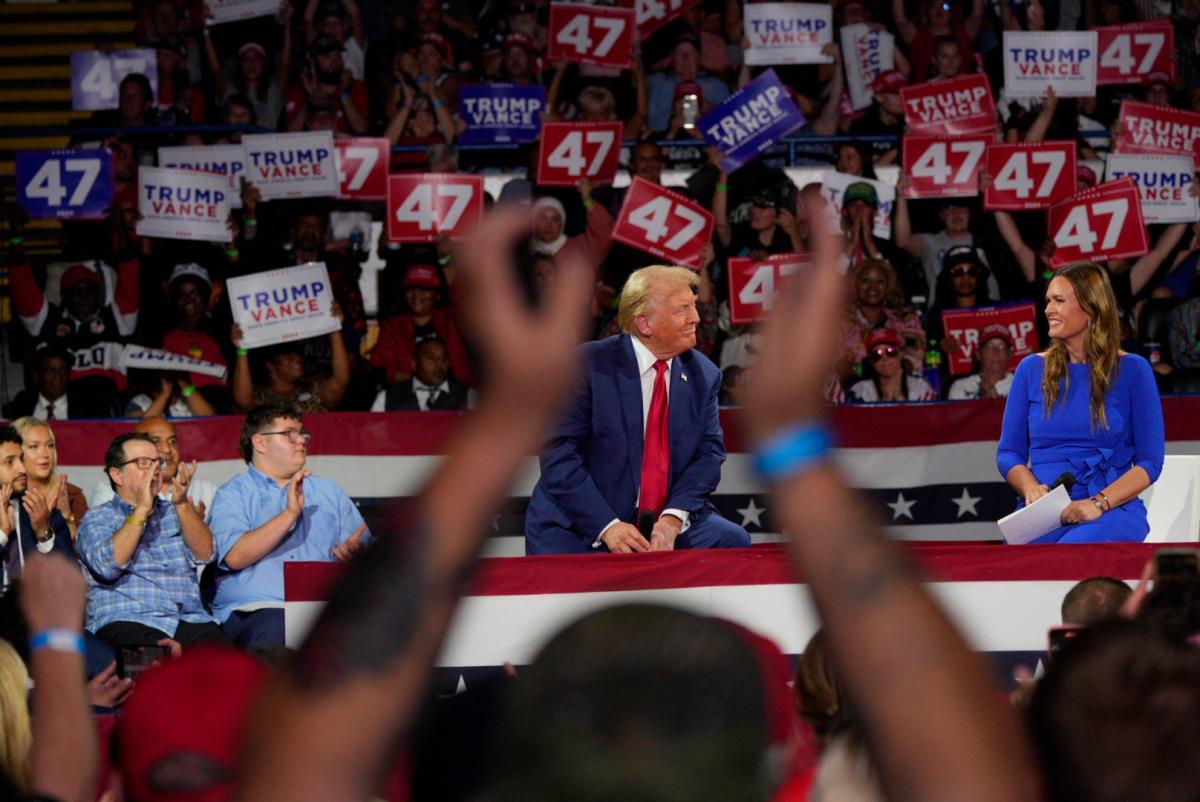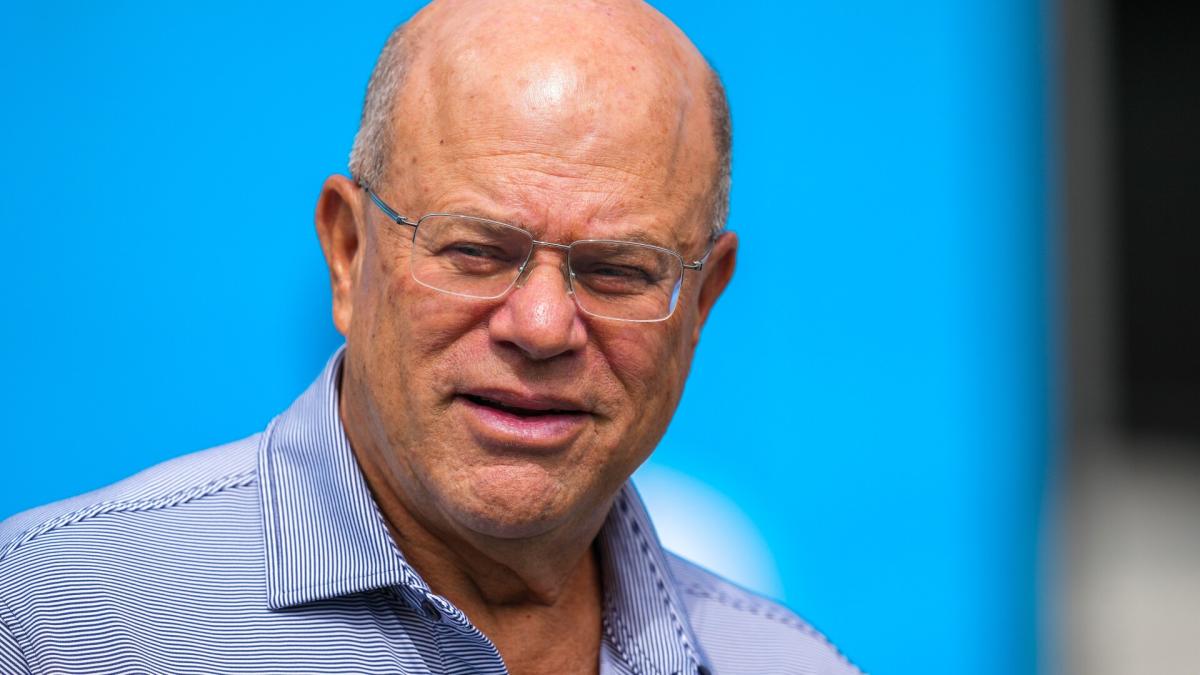Dhaka, Bangladesh
CNN
—
The prime minister of Bangladesh, Sheikh Hasina, resigned and reportedly fled the country on Monday after protesters stormed her official residence after weeks of deadly anti-government demonstrations in the South Asian nation.
Scenes of jubilation erupted on the streets as protesters celebrated the end of her 15 years in power by climbing on tanks and scaling an imposing statue of Hasina’s father, independence leader Sheikh Mujibur Rahman, in Dhaka, attacking the head with an axe.
In a national address, Bangladesh’s army chief, Gen. Waker-uz-Zaman confirmed Hasina had resigned and said the military would form an interim government.
Addressing protesters, largely young Bangladeshis and students, he said: “Whatever demands you have we will fulfil and bring back peace to the nation, please help us in this, stay away from violence.”
“The military will not fire at anyone, the police will not fire at anyone, I have given orders,” he added.
Images showed flames billowing from vehicles near Hasina’s house, and protesters inside the building, smashing walls and looting its contents.
Earlier in the day, the military and police had attacked demonstrators rallying in the area, according to a journalist working for CNN in Dhaka.
At least 91 people were killed and hundreds injured on Sunday in clashes between police and protesters demanding the scrapping of quotas for government jobs and the resignation of the prime minister. Opponents say the civil service job quotas are discriminatory.
The death toll on Sunday, which included 13 police officers, was the highest for a single day from any protests in the country’s recent history.
The figure surpassed the 67 deaths reported on July 19, when students took to the streets against the quotas, Reuters reported. At least 32 children were killed during protests last month, UNICEF said on Friday.
The widespread unrest – which spilled into the cities of Rajshahi, Barisal and Chittagong among others – prompted the government to impose an indefinite nationwide curfew over the weekend. Meanwhile, human rights groups accused authorities of using excessive force against protesters, a charge the government denies.
The US State Department and the UN Secretary General both urged restraint and for all parties to refrain from further violence following the prime minister’s resignation.
“Too many lives have been lost over the course of the past several weeks, and we urge calm and restraint in the days ahead,” State Department spokesperson Matthew Miller said at a briefing on Monday.
UN Secretary General António Guterres emphasized “the importance of a peaceful, orderly and democratic transition,” according to a statement from his deputy spokesperson.
“The Secretary-General stands in full solidarity with the people of Bangladesh and … continues to underscore the need for a full, independent, impartial and transparent investigation into all acts of violence,” Farhan Haq said.
The US embassy in Dhaka urged US citizens to “shelter in a safe place,” in new travel guidance issued Monday. Authorities added that US nationals in the capital should consider returning to their home country, amid the “unpredictable and volatile” atmosphere.
The main flight hub in Dhaka, the Hazrat Shahjalal International Airport, was temporarily closed following Hasina’s resignation, according to the Bangladesh Sangbad Sangstha (BSS) state news agency.
On Sunday, Hasina had accused student protesters of being “terrorists,” attempting to “destabilize the nation,” Reuters reported. “I appeal to our countrymen to suppress these terrorists with a strong hand,” she said.
Earlier this year human rights organizations expressed concern over increased reports of political violence, following a general election that saw Hasina secure a fourth consecutive term in office.
The main opposition Bangladesh Nationalist Party boycotted the national vote in January, as critics warned Hasina and her government were headed toward a one-party system marred by accusations of authoritarianism.
While Hasina’s resignation was celebrated, some Bangladeshis expressed trepidation as to the path ahead as the country attempts to fill a leadership vacuum.
“Hasina may be gone, but there is still a long road ahead for Bangladesh – until our religious minorities and ethnic minorities are protected and justice comes to them too, the nation is not free,” Khatib Zahin, 28, told CNN.
Another resident, Arifeen Mahmood Khan, said: “Let’s be better, stronger and kinder than we’ve ever been before. Let’s work together to build a better Bangladesh we’ve always dreamed of.”
Police opened fire on protesters in Dhaka earlier in the day, according to a journalist working for CNN, even as security forces have been under scrutiny for unleashing a wave of brutality on demonstrators.
At least four people sustained injuries as protesters were gathering at Dhaka Medical College on Monday, according to the journalist. One of those people was shot in the head.
Protesters told CNN that the military was blocking Dhaka Medical College Bakshibazar Gate. Police also used tear gas on protesters there, according to a demonstrator on the ground.

Students and protesters at Dhaka University Campus and the Shaheed Minar, a national monument in the capital, were beaten by police as they assembled at these locations.
Protesters there said that the police had attempted to break up the crowd by “brutally beating” them with bamboo sticks and using tear gas.
“Direct open firing took place in Shahbag area 15 minutes ago. We don’t have an estimate of how many were injured. It is still ongoing. Near Motijhil Shantinagar, tear gas has been fired on common people,” one demonstrator told CNN.

In other locations across Dhaka, the military has also fired warning shots in the sky and towards protesters.
Details and videos are scant as Bangladesh is in the midst of a “near-total national internet shutdown after earlier social media and mobile cuts” according to data from Netblocks, a global internet monitor.
Video posted on social media and verified by CNN showed security forces launching live rounds into the air near protesters on the N1 highway in Dhaka.
Protesters in Dhaka told CNN that the university campus had been surrounded by armed forces.
This is a developing story and will be updated.
Correction: This story has been updated to reflect the fact that at least 91 people were killed in clashes on Sunday.

David Turner is a globe-trotting journalist who brings a global perspective to our readers. With a commitment to shedding light on international events, he explores complex geopolitical issues, offering a nuanced view of the world’s most pressing challenges.







